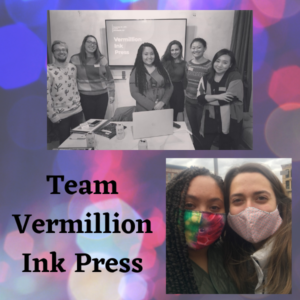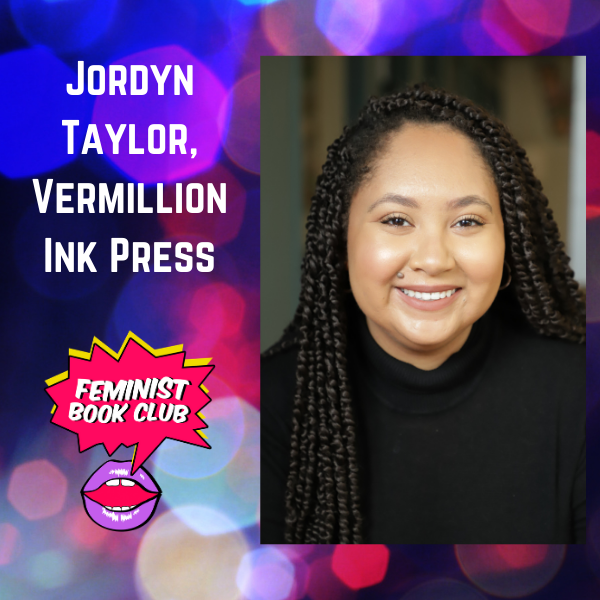Vermillion Ink Press is a literary multimedia collective and publisher of fiction, nonfiction, and poetry from underrepresented voices. Based in Minneapolis, Minnesota , it seeks to “increase empathy, foster discussion, and cultivate community through the power of the written word.” The Feminist Book Club partnered with Vermilion Ink Press for December, 2020. Proudly BIPOC owned and operated and founded in September, 2019, the Press is staffed by “young editors who are determined to change the way literary publishing navigates representation … and sustainability.” We interviewed Jordyn Taylor, the founder of Vermillion Ink; she is a writer, editor, and publisher living in Minneapolis, Minnesota. Editor’s Note: This interview has been edited for length and clarity.
Rashmila Maiti: As we are a book club, what are your favorite genres? What were your top three reads of 2020? What are you looking forward to read in 2021?
Jordyn Taylor: My favorite genre is fiction and I spent a lot of time last year reading books by Black women authors. My top 3 favorites were Homegoing by Yaa Gyasi, Behold the Dreamers by Imbolo Mbue, and Americanah by Chimamanda Ngozi Adichie. The last was re-read and it is definitely a good starting point for Adichie’s books. I am looking forward to reading Brit Bennett’s The Vanishing Half and The Mothers this year.
RM: What do you think are some of the problems plaguing the publishing industry?
JT: I definitely think there is a representation problem, not only with authors but also with staffing in the industry. When publishing companies are presented with a book by people from diverse or underrepresented backgrounds, I think sometimes they don’t know how to market that book to the public or give the author the best possible experience. It can be a bit of a blind spot for them as their staff is not prepared to deal with some of those topics.
RM: Often, people end up stereotyping books, like racism for Black authors, government and land issues for Indigenous authors, trauma for Asian authors, or immigration for Hispanic authors. Do you think that the publishing industry can do something about this perception that people have of various races and cultures?
JT: Yes, I definitely think that we need to stop pigeonholing authors and recognize that all types of people have the ability to tell a wide variety of different types of stories. Giving people the chance to do that will be the first step to address that problem. Just because you come from a specific background, doesn’t mean that you have to address a certain topic. I think other writers have the ability to talk about what they want. So, writers from underrepresented backgrounds should be given the opportunity as well. We all lead such interesting and complex lives that deserve to be showcased in media and in books.
RM: What was the driving force behind creating the Vermillion Ink Press?
JT: I noticed that there was an issue of representation in the books that were being published and in the staffing (people who are working in the publishing industry). And I really wanted to do what I could do to make a change. I brought this up with other people in the industry and found that people were agreeing with me and just didn’t know how to go about making a difference. So I said that if no one else was going to do something about it, then I am going to try my hardest to do something. And this materialized into Vermillion Ink Press.
RM: As an independent press, how are you trying to solve this issue of representation in staffing at the Press?
JT: Right now at Vermillion Ink Press, we have an all-volunteer staff and we are primarily people of color. We are also at least 50% queer and really putting an emphasis on letting people of color and underrepresented folks speak for themselves. We do have allies who work for our company as well but there is an understanding that we are trying to support underrepresented narratives. Our allies work hard to support and uplift us and ensure that everyone gets what they need.

Andrea and Jordyn — Jordyn and VIP team member Andrea Nelson wear face masks during COVID
RM: What is your vision for Vermillion Ink Press?
JT: My vision for Vermillion Ink Press is that eventually we will be fully up and running to the point where we will be able to publish 20 to 30 books a year and producing multimedia projects that really show a wide breadth of representation and bring together people, cultivate a literary community, and show people that they and their stories matter.
We will be publishing fiction, non-fiction, and poetry, all with a literary scope for our book projects. For our multimedia projects, we will be looking to do videos and audio projects that support that literature. For example, poetry videos, literature videos, maybe podcasts, and we also plan to have a full-fledged digital program. As per the program, everything will be available as an e-book, physical book, and audiobook on all possible platforms. Part of that has to do with our mission on accessibility. We want to make sure that our books are accessible, regardless of ability status or financial status. Maybe one version is easier for someone to read, or a bit cheaper for them to buy, they can access the product that way.
RM: What are the various services that Vermillion Ink Press offers?
JT: We will be taking an author from the raw manuscript, through the editing process, to the final published and printed book. We will also format the books and design the book covers. We will develop a marketing plan for each title. We will also be making sure the books get distributed nationwide. We will sell the books ourselves but also get them to stores and online platforms. We are not a pay-to-publish company or a hybrid publisher. We will be searching for unsolicited manuscripts as well as represented and agented manuscripts when it comes to buying work from creators.
RM: What are the biggest challenges that Vermillion Ink Press is facing?
JT: Right now, that would be fundraising and building our infrastructure. It can be really hard as a woman-owned business and person of color owned startup to do something completely brand new on your own. And then we have the setback of COVID and had to readjust our strategy. We were supposed to present at a big book festival and that did not happen. So we are trying to get the word out and let people know that we exist and show them what we are trying to do. We will keep moving forward and we are trying to partner with other organizations that have lent a helping hand to build some of that infrastructure which has been extremely helpful. Now, we are applying for grants for funds. We did raise our first $2500 which was very encouraging. We are always accepting donations on our Give MN page.
RM: What are some areas of opportunity for Vermillion Ink Press?
JT: Our biggest opportunity would be connecting to the authors and creators. We are thrilled to get the word out and see what people can do and what kind of stories they want to tell. We know that during the pandemic, people have been doing so much writing and creating. We are excited to offer a platform to help those projects take flight and be shown to the world.
RM: What are Vermillion Ink Press’s plans for the Minnesota Black Publishing Arts Collaborative?
JT: Right now all the presses that are involved in the collaborative are there to support each other, lend advice, and help each other to take the next steps to become successful with our projects. We also hosted an event after the death of George Floyd called Black Writers Healing on Zoom. We had a really high attendance; I think 80 people came. Different writers talked about healing mechanisms through writing and art. We do plan on conducting more of those events in the future. We also plan on applying for grants, as a group, and distributing that money throughout the collaborative to help support its various arts and publishing projects.
RM: Can you tell us what kind of events Vermillion Ink Press is planning to host in 2021?
JT: Regarding events, we would love to hold some readings over Zoom or in-person. We would also like to develop some curriculum and teach some classes so that writers who have been working on projects and do not know what steps to take next can figure out their path. Or maybe if they have an idea that has been kicking in their brain for a little bit and they don’t know where to start, we can help them get going on their journey. We have also thought about doing some sort of a book club, too, once we get some published works going.

RM: What are your plans for the future of Vermillion Ink Press?
JT: Our immediate plans are to publish our first three books, make sure we are paying our authors fairly and equitably, and get some paid staff onboard. Eventually, I would like us to have an office or gathering space where we can host events and host the community.
RM: What advice would you give to a BIPOC writer on getting published?
JT: My number one advice would be to stay true to yourself and your story. So many times, people feel they need to alter their narrative to appeal to the masses but we are really starting to see that our voices and our stories matter and deserve representation. At VIP, we are focused on BIPOC and queer narratives but also stories by immigrants, refugees, people with disabilities, religious minorities, and women supported narratives, just a wide scope of underrepresented narratives. I think many presses are trying to diversify their content and there is a lot of opportunity for BIPOC writers right now. Here is my advice:
1. Make sure you write the best possible content you can and revise, revise, revise! Ask peers to read your work so you can improve upon your drafts
2. Find a good agent, nowadays, there are agencies that specialize in representing authors from diverse backgrounds. They will help protect your work and get you the best deal.
3. Research your genre and clearly understand how your book fits into the literary landscape. How will it appeal to readers? Is it too similar to another book? You want to be unique.
4. Network! Connect with like-minded writers and potential readers. You can support each other and keep aware of writing contests, grant deadlines, or opportunities to submit.
RM: How can I get more involved?
JT: Right now, you can follow us on all our social media channels; we are primarily on Instagram as well as Twitter and Facebook. Next, spread the word and tell a friend about us because we love to bring new people to the fold and show them what we can do. If you want to make a donation, that always helps us get on. You can also share our donation link. Also, if you know good books by people from underrepresented backgrounds, then share them with your friends and family because those authors and creators need your support. Lastly, always support your local independent bookstores because we need them to keep this community of publishers, book clubs, and bookstores thriving and moving forward.
Jordy Taylor image- Amy Jeanchaiyaphum, eyelovephoto.com


